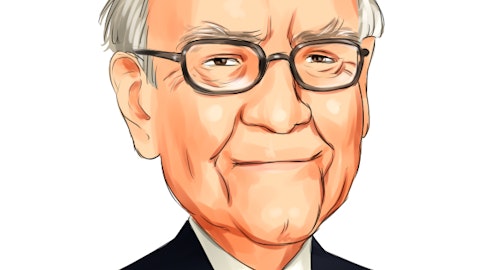Mark Mason: Yeah. Thanks, Jane. And why are expenses down more? I think, to your point, Jane, we’ve been investing in the franchise, both on the front end and importantly on the transformation and the risk and controls. What I would point out is that in 2023, we delivered expenses of $54.3 billion, ex the FDIC charge. That is the guidance that we gave. But I’d also highlight that we also included $780 million associated with the restructuring charge that is more than I had articulated in the way of guidance. So the capacity that we created through our efforts through the year, we use that in a smart way. We use that to fund the org simplification costs so that we can realize the savings down the line and we’re going to continue to manage our expenses in a disciplined and smart fashion.
That means spending what we need to spend on the transformation and risk and controls, but driving greater efficiencies and productivities along the way to ensure we get to that 11% to 12%. And to your point of revenues are to come down or come in lower-than-expected, we’ll adjust the expenses accordingly.
Operator: Thank you. Our next question comes from Glenn Schorr with Evercore. Your line is now open.
Glenn Schorr: Hi. Thanks very much. So, you’re clearly making a lot of progress, and I hate to like ask this question too early, but I think it is important. Your expense guide is good, your revenue guide is good, and you have your arms around the expenses, so the question I have is, how do you think about balancing that near-term profitability improvement that we all want desperately with making sure you do make the right investments, because if you look around the world, there’s a lot of places to grow, whether it’d be your branch network or wealth management aspirations that you have or the digital investments, so how do you — how do we know that all the right future investments are being made, while you extract costs in all the good ways that you’ve been doing?
Mark Mason: Yeah, thanks, Glenn. I guess, I’ll start and Jane, feel free to add in on it. Look, it is a balancing act, right, and we do look at each of our five core businesses. We, obviously, are clear on the strategy, but where is the growth, where the return opportunities associated with them, and how do we ensure we are deploying resources after them in order to deliver for the client and deliver on those returns over time? We have to juxtapose that against the required investments to modernize our operations and we’re making those trade-offs on a regular basis. But importantly, when we do invest to capture those growth opportunities, we’re agile, we’re trying to be agile about it, which means, if those opportunities don’t play out in the way we’re expecting, because the cycle just doesn’t mature or materialize in that fashion, we’ve got to be disciplined enough to dial them back and that’s what you’ve seen over the past year-plus, is that we’ve been investing in the business where we didn’t see the upside that we anticipated, we dialed back that spend, right, and that’s the type of iterative process, if you will, Glenn, that we’re putting in place to ensure that on the other side of this we’re still positioned to capture growth.
Investment Banking, for example, we’ve invested in healthcare and technology, building out to prepare ourselves for when that market rebounds. We feel good about that. We’ve done similar things in the way of our wealth business. We are investing heavily in our TTS franchise to ensure we can remain competitive there. So it’s that type of discipline that’s required. It is sometimes a trade-off, but it’s one that we’ve been very focused on being smart about.
Glenn Schorr: I appreciate that. Maybe a quickie on Services, obviously, up 16% in a record, it’s great. I don’t know if you’ve dimensionalized how much was rate versus new business, but you have good core business momentum and a pipeline of one, but not yet funded. So I guess the question is that, where can Services be over, let’s say, the next two years in terms of growth, while rates come down yet your business is winning new wins?
Mark Mason: Yes, sure. Do you want me to? Sure.
Jane Fraser: Yeah. And I’ll jump in. Let’s maybe start with TTS. When we think about the performance of TTS, which, as we say, the growth this year, up 19%, ex-Argentina, came from a combination of both rates and the strong business actions we’ve taken. And you can see that in the different drivers. Cross-border was up 23%, commercial cards up 8%. And in terms of the growth prospects, we’ve generated 22% in average revenue growth from ’21 to ’23, well ahead of the Investor Day guidance we had a high single-digit. That was not just because of the rate cycle. It obviously helped, and we certainly expect to grow revenues at mid-single digit now as we lap the prior periods that benefited from those rate increases. And that’s going to come from a few different areas.
One, the focus on our fee strategy, where we’re capitalizing on strong client engagement, market-leading client solutions, and we’re delivering on a lot of the different growth initiatives that we’ve been investing in across all our client segments. We’ll continue optimizing our deposit book and bringing in high-quality deposits. And in a lower rate environment, GDP is typically higher, so you’d expect to see some higher growth in our capital-efficient payment volumes. You’ll see us continuing to acquire new clients and deepen relationships with existing clients. And I point to our confidence here 27% increase in our new client acquisition this year and a sustained win-loss ratio of 82% on new deals. And that was across different client segments.
And revenues from these clients just continues to ramp up as we expand across the different geographies and product suites with them. And you’ll also continue to see us investing in the infrastructure and platforms we’ve been doing, launching new innovative products, and we’re seeing momentum from some of the things we’ve recently done, Citi Token Services, Payment Express, 24/7 Clearing, et cetera. So I think the main takeaway from TTS is that we’ll continue to invest in it. We expect to see strong client momentum. We’ve been getting consistently good client feedback regarding our capabilities. So we expect to see good global growth that will certainly help as the rate cycle comes down. And it is a crown jewel for a reason. And then just quickly on security services, I think, where we’re seeing, we mentioned we’ve got a number of marquee wins there across all the client segments.





